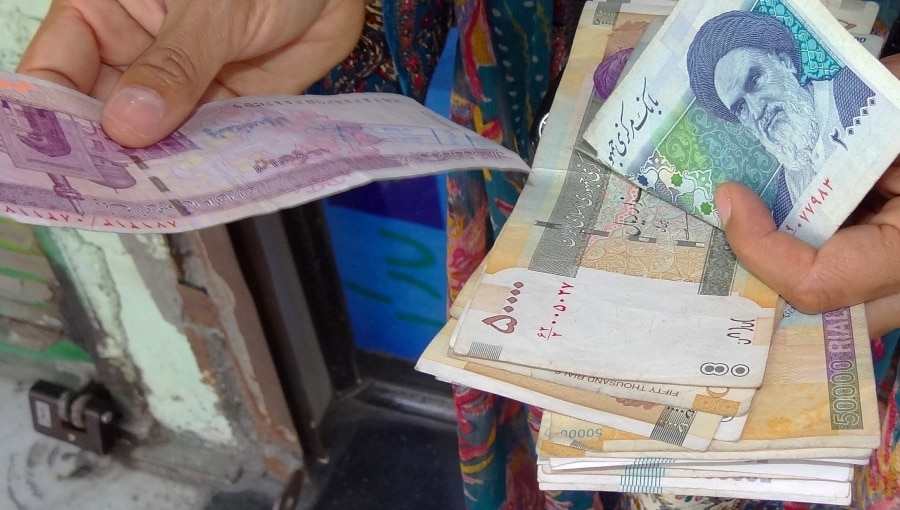Officials talk of “Resistance Economy” as Iran faces isolation
LATEST
Iran’s fragile economic situation has worsened, with the currency plummeting almost 10% since Saturday and more foreign companies announcing suspension of business amid US withdrawal from the nuclear deal and threatened sanctions.
The Iranian rial dropped to a new all-time low, falling to about 71,500:1 v. the US dollar. The sudden slide followed a short-term respite after the currency lost 40% of its value earlier this year, closing on 70,000:1 last month before Government intervention brought a short-term, small recoverty to 65,000:1 — still well above the official rate of 42,000:1 that was announced this spring.
Tuesday’s fall indicated the failure of the latest measures, which have included raising of interest rates on savings, a change from the dollar to the Euro as the official recording currency, and detentions of unofficial currency traders.
In contrast to some coverage of the currency crisis last month, Iranian English-langauge media do not mention yesterday’s drop, which comes just over a month after Donald Trump announced that all foreign companies with US ties must halt trade and investment with Iran by November.
Another Indian Refiner, German Shipper Join Firms Cutting Ties
Indian refiner Nayara Energy — owned by Russian State oil giant Rosneft and partners — is among the latest firms to begin drawing down business.
The company, formerly named Essar Oil before the Russian purchase for $12.9 billion last year, buys about 5.5 to 6 million barrels of oil per month from Iran.
“Nayara will be lifting about 40-50% less than the average volumes, limiting its intake of Iranian oil to about 3-4 million barrels in a month,” said one source with knowledge of the arrangements.
Leading Indian refiner Reliance Industries has already announced that it intends to halt business with Iran by November.
Other foreign companies who have announced suspensions include European companies suspending business with Iran include French car manufacturer PSA; French energy giant Total, which was planning a $4.9 billion investment in the South Pars gas field; France’s Airbus, which had contracted to deliver 100 passenger planes to Tehran; German insurance company Allianz; and shipping firm Maersk.
German shipping line Hapag-Lloyd joined them this week, halting one of two feeder services to Iran and deciding on the remaining one before the US deadline of November 4.
Hapag-Lloyd is the world’s fifth-largest container company. MSC, the world’s second-largest container shipping line, said last month it will stop taking new bookings for Iran, although it will complete acceptable cargoes such as foodstuffs until the autumn.
On Monday, President Hassan Rouhani’s senior advisor Mohammad Baqer-Nobakht insisted that Iran can withstand the economic pressure, saying that the Supreme Leader’s “Resistance Economy” would prevail.
Baqer-Nobakht said, “We have devised 56 plans and 200 projects to implement the Resistance Economy policies.” He did not identify any of them.
The head of the Securities and Exchange Organization said on Tuesday that Iran will issue bonds in coming months to fund energy projects, covering the departure of international firms from Total to Russia’s Lukoil.
Shapour Mohammadi did not say if Iran would try to raise the money on foreign markets despite US sanctions, saying instead that the step “will help all Iranians to participate in investment in oil projects”.
Iranian Oil Minister Bijan Namdar Zanganeh has said $20 billion per year over the next decade is needed for the country’s oil and gas sector.
Human Rights Lawyer Sotoudeh Arrested Again
Leading human rights lawyer Nasrin Sotoudeh has again been detained, amid a crackdown by Iran’s hardline judiciary.
Sotoudeh was arrested on Wednesday by security forces and taken to Evin Prison, her husband said.
Reza Khandan, writing on Facebook, quoted his wife:
Once in the interrogation room I told the interrogators that: “Of all the things that the government should do for its country, you only know one, and that’s to capture people.”
Sotoudeh was harassed and then imprisoned for representing political prisoners held amid the mass protests over the disputed 2009 Presidential election. She was sentenced in January 2011 to 11 years in prison and barred from practicing law and from leaving the country for 20 years. An appeals court later reduced Sotoudeh’s prison sentence to six years, and the ban on legal practice. She was released in September 2013 along with ten other political prisoners, days before an address by recently-election President Hassan Rouhani to the United Nations.
Recently the lawyer had been defending women who had been arrested for taking off hijab in public demonstrations.
Sotoudeh received the European Union’s most prestigious human rights award, the Sakharov Prize for Freedom of Thought, in 2012.
The judiciary and Revolutionary Guards have stepped up detentions and sentencing of activists, amid in-fighting within the regime over social, political, and economic issues. Last week the judiciary decided that only a pool of 20 preselected lawyers can represent political defendants. Sotoudeh was not one of them.


Prof. Steve Hanke
Verified account
@steve_hanke
10h10 hours ago
More
#Iran’s annual inflation rate measured for today, 6/13/18, is 99.3%
https://pbs.twimg.com/media/Dfl_7clXcAEQqVf.jpg:large